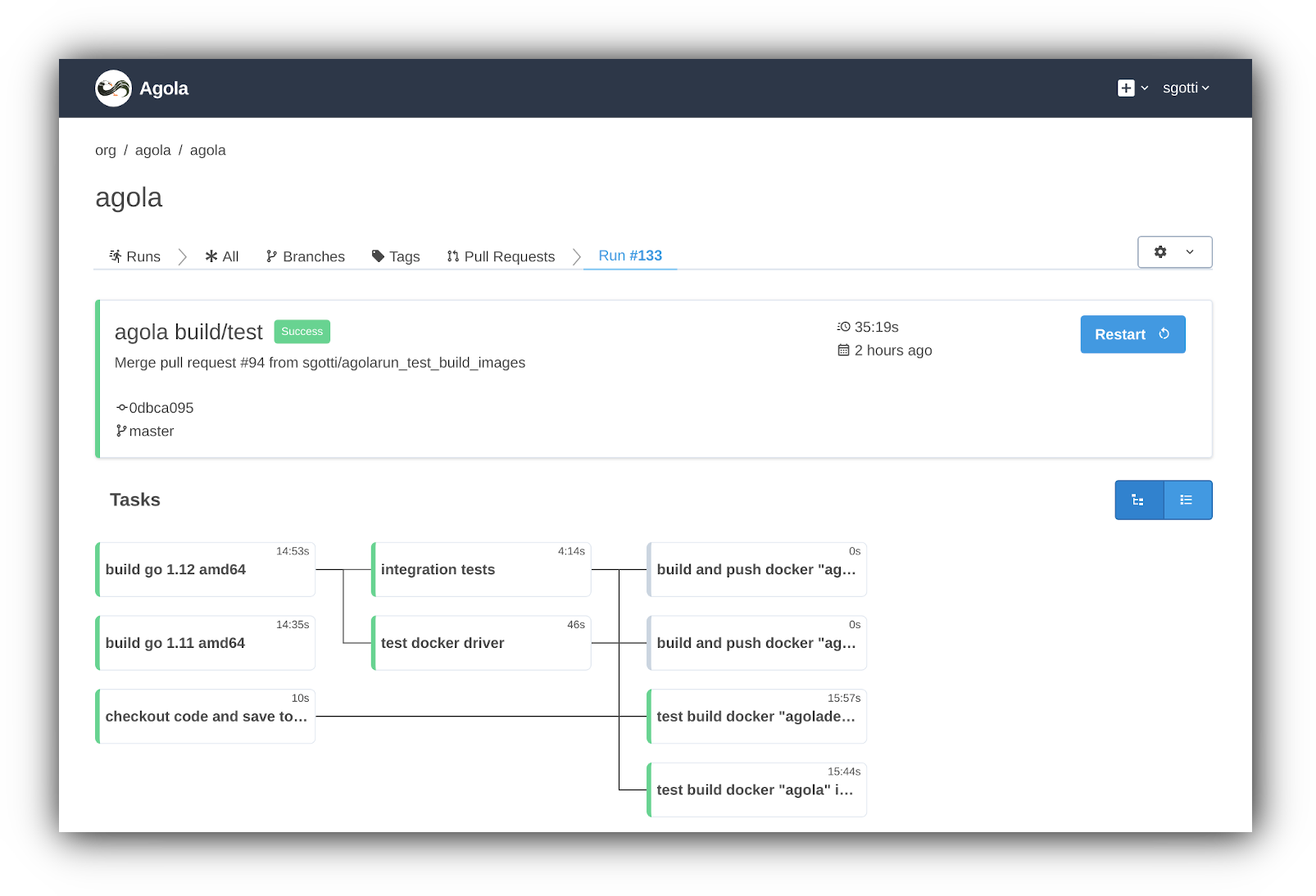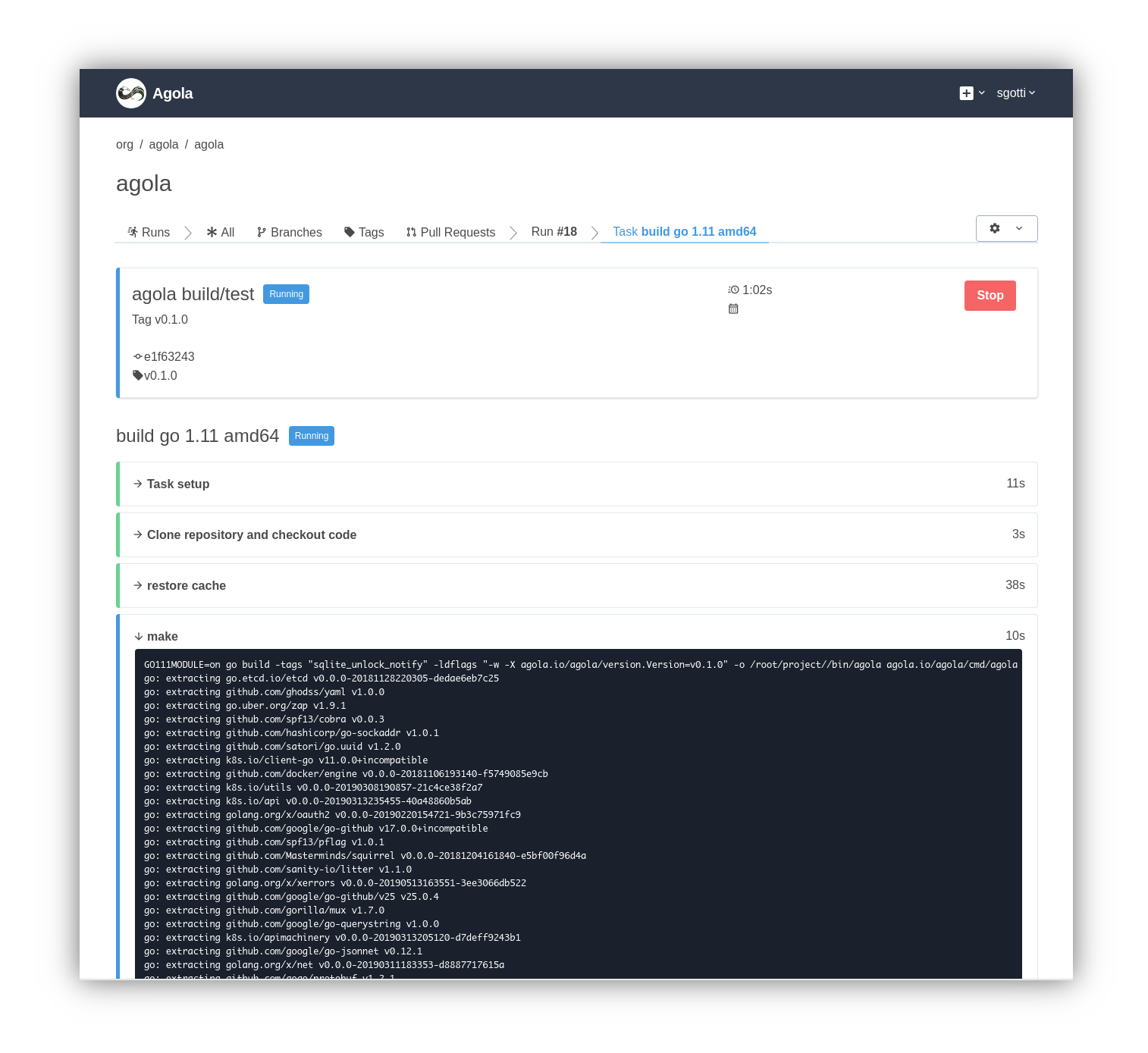https://github.com/agola-io/agola
Agola: CI/CD Redefined
https://github.com/agola-io/agola
ci-cd cicd continuous-delivery continuous-deployment continuous-integration devops distributed docker git gitea github gitlab golang high-availability kubernetes
Last synced: 8 months ago
JSON representation
Agola: CI/CD Redefined
- Host: GitHub
- URL: https://github.com/agola-io/agola
- Owner: agola-io
- License: apache-2.0
- Created: 2019-05-24T10:23:26.000Z (over 6 years ago)
- Default Branch: master
- Last Pushed: 2025-05-12T14:59:22.000Z (8 months ago)
- Last Synced: 2025-05-12T15:59:00.493Z (8 months ago)
- Topics: ci-cd, cicd, continuous-delivery, continuous-deployment, continuous-integration, devops, distributed, docker, git, gitea, github, gitlab, golang, high-availability, kubernetes
- Language: Go
- Homepage: https://agola.io
- Size: 3.32 MB
- Stars: 1,562
- Watchers: 32
- Forks: 122
- Open Issues: 72
-
Metadata Files:
- Readme: README.md
- Changelog: CHANGELOG.md
- License: LICENSE
Awesome Lists containing this project
- awesome-ops - agola-io/agola - 2.0|1585|2019-05-24|2025-09-24 | 以容器化形式运行的 CI/CD 工具 | (CICD)
- awesome-gitea - agola - Agola: CI/CD Redefined. Built-in Gitea support.(see [``docs``](https://agola.io/tryit/#test-using-a-local-gitea-instance)) (Applications / DevOps)
- awesome-gitea - agola - Agola: CI/CD Redefined. Built-in Gitea support.(see [``docs``](https://agola.io/tryit/#test-using-a-local-gitea-instance)) `Apache-2.0` `Go` (Applications / DevOps)
- awesome-gitea - agola - Agola: CI/CD Redefined. Built-in Gitea support.(see [``docs``](https://agola.io/tryit/#test-using-a-local-gitea-instance)) (Applications / DevOps)
README
# Agola
[](https://run.agola.io/org/agola/projects/agola.proj)
[](https://talk.agola.io)
CI/CD redefined
For an introduction to agola you can take a look at [this post](https://sorintoss.io/blog/agola-introduction/)


## Try it
See [the agolademo example](https://agola.io/tryit)
## Features
* Easy to install and manage.
* Scalable and High Available: go from a single instance (single process) deployment to a distributed deployment.
* Deploy anywhere: Kubernetes, IaaS, bare metal and execute the "tasks" anywhere (currently containers executors like docker or orchestrators and Kubernetes, but easily extensible to future technologies or VMs instead of containers).
* Support any language, deployment system etc... (just use the right image)
* Integrate with multiple git providers at the same time: you could add repos from github, gitlab, gitea (and more to come) inside the same agola installation.
* Use it to manage the full development lifecycle: from build to deploy.
* Tasks Workflows (that we called **Runs**) with ability to achieve fan-in, fan-out, matrixes etc..., everything containerized to achieve maximum reproducibility.
* Git based workflow: the run definition is committed inside the git repository (so everything is tracked and reproducible). A run execution is started by a git action (push, pull-request).
* Design it with the ability to achieve at most once runs: during a deployment to production we don't want multiple concurrent execution of the deploy...
* Restartable and reproducible Runs (restart a run from scratch or from failed tasks using the same source commit, variables etc...)
* [User Direct Runs](https://agola.io/doc/concepts/user_direct_runs.html): give every user the power to test their software using the same run definition used when pushing to git/opening a pull request inside the Agola installation with just one command like if they were running tests locally (without requiring a super powerful workstation).
* Testable "Runs" (what is a CI/CD environment if you cannot test your changes to the Runs definitions?): use the same run definition but use a powerful [secrets and variables system](https://agola.io/doc/concepts/secrets_variables.html) to access different resources (environments, docker registries etc...).
* Don't try to extend YAML to be a templating language but use a real templating language (as of now [jsonnet](https://jsonnet.org/)) to easily generate the run configuration without side effects.
* An advanced permissions system (work in progress).
* Dependency Caching to speed up tasks
## Documentation
https://agola.io/doc/
## Local development
See [how to develop agola](doc/devel.md)
## Contributing to Agola
Agola is an open source project under the Apache 2.0 license, and contributions are gladly welcomed!
To submit your changes please open a pull request.
## Contacts
* For bugs and feature requests file an [issue](https://github.com/agola-io/agola/issues/new/choose)
* For general discussion about using and developing Agola, join the [agola forum](https://talk.agola.io)